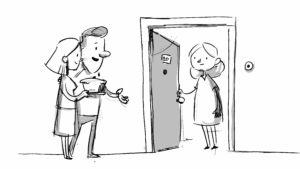Tag Archive for: selfishness
Selfish vs Selfless
Recently, these two words have played over and over again in my mind. Perhaps writing this post today, will help – a little!! In order to understand selflessness, we must understand its opposite, selfishness.
- Selfishness is defined as too much concerned with one’s own welfare or interests, with little or no thought for others
- Selflessness is defined as being devoted to others’ welfare or interests and not one’s own.
So where do you stand with these two principles? Somewhere in the middle perhaps? Or is there a real distinct character trait that you can clearly identify with?
Selfishness
A selfish person frequently uses the terms, “I”, “me”, and “mine” as opposed to “we”, “ours”, “yours” or “theirs”. Generally, you’ll find that a selfish person is keen to be in the limelight, and that ultimately they’ll find no happiness in constantly pursuing a personal or business agenda filled with selfishness. Viewed in its true sense, selfishness is the absence of empathy and compassion. The products of selfishness tend to be, loneliness, arrogance, pride, lying, hypocrisy, greed, and idleness. The selfish idleness, with its “I’ll do it later” attitude is procrastination at its extreme. I love this quote from a wise leader Gordon B. Hinckley, “Selfishness is a destructive, gnawing, corrosive element in the lives of many people. But the antidote to selfishness is service, reaching out to those about us – those in the home and those beyond the walls of the home”
Selflessness
So what of Selflessness? It is unquestionably a marvellous virtue. It is the giving of ones self in the serving of others and the giving of ones self in being served by others. Through my experience of many years of building long lasting personal and successful business relationships, the key to it all is selflessness and service. Selflessness produces kindness and dispels hypocrisy. It develops confidence, trust and the embodiment of authentic servant leadership in every interaction with others. Selflessness fosters love, confidence, and trust.
The Power of Service
The idea of servant leadership goes back 2000 years, but in his modern ground breaking work in 1970, Robert K. Greenleaf coined the phrase “servant leader” and “servant leadership” in his classic essay “The Servant as Leader”. “The servant-leader is servant first… It begins with the natural feeling that one wants to serve, to serve first. Then conscious choice brings one to aspire to lead. That person is sharply different from one who is leader first, perhaps because of the need to assuage an unusual power drive or to acquire material possessions…The leader-first and the servant-first are two extreme types. Between them there are shadings and blends that are part of the infinite variety of human nature.”
“The servant-leader is servant first… It begins with the natural feeling that one wants to serve, to serve first. Then conscious choice brings one to aspire to lead. That person is sharply different from one who is leader first, perhaps because of the need to assuage an unusual power drive or to acquire material possessions…The leader-first and the servant-first are two extreme types. Between them there are shadings and blends that are part of the infinite variety of human nature.”
“The difference manifests itself in the care taken by the servant-first to make sure that other people’s highest priority needs are being served. The best test, and difficult to administer, is: Do those served grow as persons? Do they, while being served, become healthier, wiser, freer, more autonomous, more likely themselves to become servants? And, what is the effect on the least privileged in society? Will they benefit or at least not be further deprived?”
What we desperately need today in our homes, schoolrooms and boardrooms, and certainly throughout society at large – are leaders, men and women who are willing to stand for principles of goodness and virtue. In leadership standing for these principles, there is often loneliness – but ultimately the courage of one’s convictions brings great happiness, joy and long lasting relationships of trust and happiness.
How can you develop greater selflessness?
